
























OAKLAND COUNTY BAR ASSOCIATION
1760 S. Telegraph Road, Suite 100
Bloomfield Hills, Michigan 48302-0181 (248) 334-3400 • FAX (248) 334-7757 www.ocba.org

PRESIDENT
Dean M. Googasian PRESIDENT-ELECT
Sarah E. Kuchon
VICE PRESIDENT
Aaron V. Burrell
TREASURER
Kari L. Melkonian
SECRETARY
Victoria B. King
EXECUTIVE DIRECTOR
DIRECTORS
Syeda F. Davidson
Julie L. Kosovec
Emily E. Long
Jennifer L. Lord
Moheeb H. Murray
Kimberley Ann Ward
Kenneth F. Neuman
Layne A. Sakwa
Jonathan B. Frank
Silvia A. Mansoor
Jennifer Quick ABA DELEGATE
LACHES EDITORIAL BOARD
Victoria B. King
Syeda F. Davidson
Coryelle E. Christie
James W. Low
Lanita Carter
Thamara E. Sordo-Vieira
THE MISSION OF THE OAKLAND COUNTY BAR ASSOCIATION IS TO SERVE THE PROFESSIONAL NEEDS OF OUR MEMBERS, IMPROVE THE JUSTICE SYSTEM AND ENSURE THE DELIVERY OF QUALITY LEGAL SERVICES TO THE PUBLIC.
Articles and letters that appear in LACHES do not necessarily reflect the official position of the Oakland County Bar Association, and their publication does not constitute an endorsement of views that may be expressed. Readers are invited to address their own comments and opinions to:
LACHES | Oakland County Bar Association 1760 S. Telegraph Rd., Ste. 100 Bloomfield Hills, MI 48302-0181
Publicationandeditingareatthediscretionoftheeditor.
LACHES (ISSN 010765) is the monthly (except July and December) publication of the Oakland County Bar Association, a Michigan nonprofit corporation, 1760 S. Telegraph, Ste. 100, Bloomfield Hills, MI 48302-0181. Copyright © 2025 Oakland County Bar Association. The price of an annual subscription ($20) is included in member dues. Periodical postage paid at Bloomfield Hills, MI 48304 and additional entry offices. Postmaster: Send address changes in writing to Oakland County Bar Association, 1760 S. Telegraph, Ste. 100, Bloomfield Hills, MI 48302-0181.
13 and Counting: A Look at the Oakland County Business Court Through the Eyes of the Judges
The judges who have served on the court reflect on what has worked well so far and what might be improved.
Business Wars: The Current Landscape with Shareholder and Member Disputes
Practitioners should know what is required to successfully advance claims by aggrieved members and shareholders. ByJehanCrump-Gibson 13
Business Payroll Tax Debts and the Trust Fund Recovery Penalty
There’s an important distinction between business income and payroll tax debt: the possibility of personal liability.




Enough, for now anyway, about the practice of law. Let’s talk about something much more important: food.
Cooking is one of my passions. ere are few things I enjoy more on a weekend — particularly a summer weekend by the pool, but really any weekend of the year — than cooking. I try tons of different recipes, some as written, some with modifications.
Over the years, my family has kindly endured some spectacular disasters. Around our place, the phrase “not my favorite” is what they say to politely let me know I’ve come up with something below par.
ese days, our house is mostly vegetarian, and I am always looking for ways to spice up our veg dishes. Here, for your consideration, is a simple recipe for a vegetarian dinner (and if you make enough, it will serve for a great salad for lunch and dinner the following day!) with what we think is a killer sauce using fresh, healthy ingredients. You could, of course, include your favorite protein (I’d pair it with grilled chicken or shrimp), but why not give veg a try?

If you end up trying the recipe, I’d love to know what you think!


Dean M. Googasian is the president of the Oakland County Bar Association.












By Dean M. Googasian
First, the sauce. e sauce, which we call ginger garlic sauce, is best made at least a day in advance. It tastes better after the flavors meld in the fridge overnight or longer.
e ginger garlic sauce is modified from a recipe I found on Allrecipes.com and is similar to a sauce you might find served at a teppanyaki restaurant.1
4 tablespoons peeled and minced fresh gingerroot
1 cup chopped onion
4 large cloves garlic, peeled and minced
Zest and juice of 2 large lemons (if you don’t have a lemon zester, a small-gauge grater will work)
1 cup coconut aminos (this is a gluten-free soy sauce alternative, sweeter with less sodium, that is available at most grocery stores; Simple Truth Organic from Kroger is our favorite)
1 teaspoon white vinegar
ere is no substitute for fresh ingredients in this recipe. Fresh ginger, fresh garlic, and fresh lemon juice are a must. Lemon zest gives the sauce a bright, sharp taste.
e key to the sauce is the preparation of the ginger, which is fibrous and can be stringy. Once the ginger is peeled, using a sharp knife, cut the ginger across the grain as thin as possible to shorten the fibers. en dice to a fine dice. e blender will do the rest.
Combine all the ingredients in a blender and blend at high speed until smooth, pausing frequently to scrape down the sides. e sauce usually gets to the right consistency in a minute or two. Put it in a bowl, cover tightly, and refrigerate overnight. e longer it melds, the better it will taste.
Now for the veg. We like zucchini, bell peppers, onions, and asparagus for this recipe, but you can use any veg you like.
3-4 zucchini
3 bell peppers (yellow, orange, and red)
2 large red onions (yellow or white will work, too)
1 bunch green onions
1 bunch asparagus
Any other veg you prefer (okra, eggplant, summer squash, etc.)

If you’re roasting in the oven, slice the zucchini into rounds. Cut and seed the bell peppers and slice them into eighths. Cut the onions in half, then cut each half into quarters. Trim the hard ends off the asparagus. Coat all the veg lightly in extra-virgin olive oil and spread out in a single layer on pans. We use aluminum sheet trays. en roast in a 400-degree oven and start checking them at 15 minutes. e longer you leave them in, the softer they’ll get. We tend to cook the asparagus until the tips get nice and crisp.
If grilling (my preferred method), slice the zucchini longways into ¼-inch steaks. e rest of the veg needs either a grilling tray, foil, or to be cut large enough not to fall through the grill grates. e veg can be served on its own or over pasta or white or brown rice. Spoon some ginger garlic sauce over the top, and you have a meal. Any leftover veg is great the following day on a salad, and the sauce makes a great dressing.
Footnote: 1. allrecipes.com/recipe/52572/ginger-dipping-sauce.






Wachler & Associates represents healthcare providers, suppliers, and other entities and individuals in Michigan and nationwide in all areas of health law including, but not limited to:
•Healthcare Corporate and Transactional Matters, including Contracts, Corporate For mation, Mergers, Sales/Acquisitions, and Joint Ventures
•Healthcare Corporate and Transactional Matters, including Contracts, Corporate For mation, Mergers, Sales/Acquisitions, and Joint Ventures
•Medicare, Medicaid, and Other Third-Party Payor Audits and Claim Denials
•Medicare, Medicaid, and Other Third-Party Payor Audits and Claim Denials
•Licensure, Staff Privilege, and Credentialing Matters
•Provider Contracts
•Licensure, Staff Privilege, and Credentialing Matters
S
S
•Billing and Reimbursement Issues
•Provider Contracts
•Billing and Reimbursement Issues
•Stark Law, Anti-Kickback Statute (AKS), and Fraud & Abuse Law Compliance
•Physician and Physician Group Issues
•Stark Law, Anti-Kickback Statute (AKS), and Fraud & Abuse Law Compliance
• Regulatory Compliance
•Physician and Physician Group Issues
•Corporate Practice of Medicine Issues
• Regulatory Compliance
•Provider Participation/Ter mination Matters
•Corporate Practice of Medicine Issues
•Provider Participation/Ter mination Matters
• Healthcare Litigation
• Healthcare Investigations
• Healthcare Litigation
•Civil and Criminal Healthcare Fraud
• Healthcare Investigations
•Civil and Criminal Healthcare Fraud
•Medicare and Medicaid Suspensions, Revocations, and Exclusions
•Medicare and Medicaid Suspensions, Revocations, and Exclusions
•HIPAA, HITECH, 42 CFR Part 2, and Other Privacy Law Compliance
•HIPAA, HITECH, 42 CFR Part 2, and Other Privacy Law Compliance

By Jennifer Quick
On May 1, 2025, all eligible OCBA members will receive a link to the online ballot to vote for their preferred candidates for the OCBA board of directors. is is your opportunity to have a direct say in shaping the future of our association.
To make it as easy as possible for you to vote, I’ve answered some common questions below:
1. How do I access the ballot?
e OCBA board election is conducted electronically. Once the ballot is open, you’ll find the link on our website, and we’ll send it directly to all eligible members via email. We’ll also send reminder emails to anyone who hasn’t voted yet before the ballot closes.
2. I’m an eligible voter, but I never received the ballot. What should I do? We know that some members may not use email, or their email provider may block our messages. If you don’t receive your ballot, you can contact me at jquick@ ocba.org or (248) 334-3400, and I can try to send you the ballot link a different way or assist you in casting your vote manually.
3. I’m not familiar with the candidates. How can I learn more about them? Each board candidate provides a bio and a profile, which outlines their qualifications and OCBA experience. e Nominating Committee works hard to ensure a diverse pool of candidates, considering factors like practice areas, firm sizes, and other key elements to reflect the breadth of our membership. Even if you’re only familiar with a few candidates, feel free to cast your vote for those who align with your views.
4. Would my vote really matter? Absolutely! In my seven years overseeing OCBA board elections, the margin of difference between candidates has often been only a handful of votes.
As a reminder, on May 1, 2025, all eligible OCBA members will receive a link to the online ballot via email. Voting will open at 8 a.m. on May 1 and close at 5 p.m. on May 9 We have partnered with AssociationVoting, a trusted third-party vendor, to ensure the election is secure, easy, and quick. e online ballot is simple to navigate, with a list of candidates,
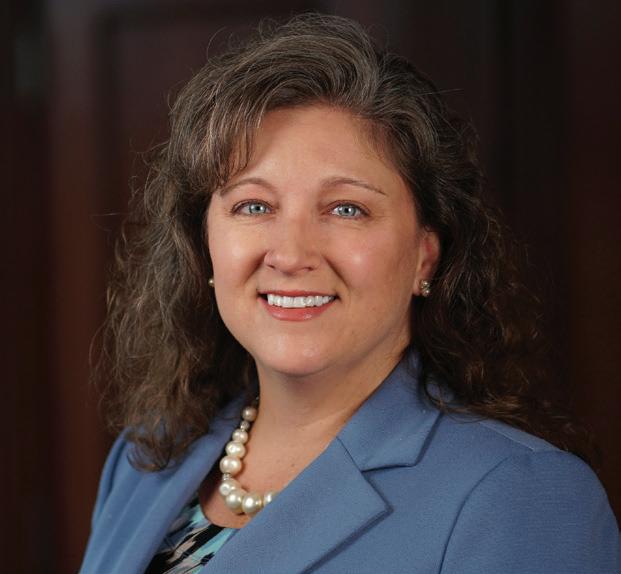



their photos, and their bios. You can select your choices with just a click!
roughout April, we’ll send a series of emails introducing the candidates and sharing their qualifications. After the ballot opens on May 1, we’ll send reminder emails to eligible members who have not yet voted. To stop receiving reminders, simply cast your vote!
Our bar association is made stronger by the diversity of its members’ opinions. As in any democracy, healthy discourse is key to sound decision-making, and your vote helps ensure that all voices are heard. Every candidate has worked hard to earn your vote, and they’re committed to representing you on the board.
Please vote to support a strong board, a thriving association, and a vibrant legal community in Oakland County.
Below and to the right is the slate of candidates running for the OCBA board.
Biographies and statements from each of the candidates can be found on the OCBA website at ocba.org/board_elections.

Jennifer Quick is the executive director of the Oakland County Bar Association.

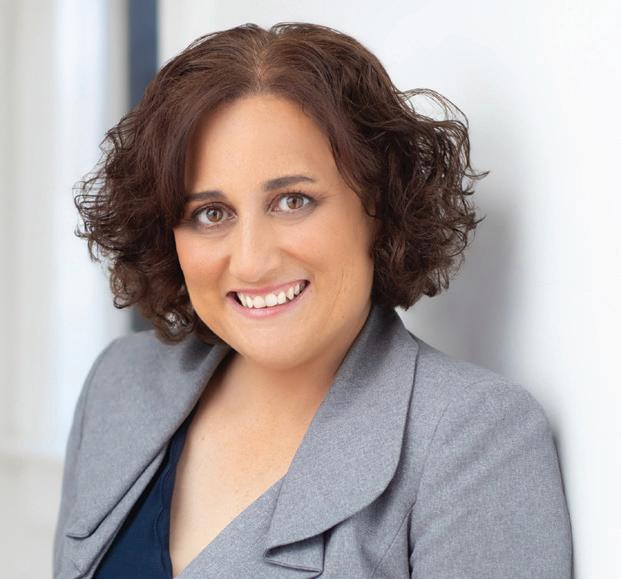

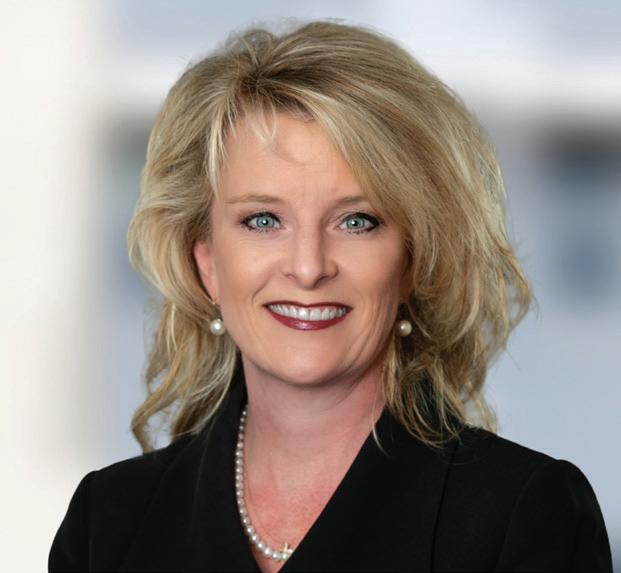



















Please Note: Dates listed below were sent to the publisher on February 3, 2025. It is possible that some of the events listed below have since been altered. Please check ocba.org/events for the most up-to-date schedule of events.

















Judges from the Oakland County District, Probate, and Circuit courts, as well as the Michigan Court of Appeals, Michigan Supreme Court, U.S. Bankruptcy Court, and U.S. District Court for the Eastern District of Michigan, have been invited to this highly anticipated annual event at The Community House in Birmingham. In addition to taking advantage of valuable networking opportunities, attendees are encouraged to explore the items featured in this year’s silent auction. All auction proceeds will support Oakland County Children’s Village. To learn more or to register, visit ocba.org/events
Our bench/bar brown-bag luncheon series continues virtually via Zoom and will feature newly appointed judge Hon. Tricia Dare from the Sixth Judicial Circuit Court Family Division. As Judge Dare wraps up her first 100 days on the bench, she will share preferred protocols and best practices for practicing in her courtroom. Bring your questions and join us for an informal discussion on legal topics and practice issues. Space is limited, so register today at ocba.org/events
The 26th annual Signature Event, a highlight of the season for many members of the association and foundation, will return to the beautiful Orchard Lake Country Club. With exceptional food, a stunning lakeside setting, and the opportunity to connect with colleagues, this event promises an unforgettable networking experience. Best of all, the proceeds will support the Oakland County Bar Foundation, helping fund vital programs for numerous deserving organizations. Tickets are limited, so be sure to secure yours today. Sponsorship opportunities are also available for those wishing to show their support for the OCBF. For more information, contact Katie Tillinger at ktillinger@ocba.org or (248) 334-3400. To learn more, visit ocba.org/signature-event







Join us from 5:30 to 7:30 p.m. for another great opportunity to mix and mingle with fellow bar members while enjoying appetizers and a cash bar. This event is free for OCBA members and space is limited, so register today at ocba.org/events
Join the OCBA at Affirmations in Ferndale for a comprehensive session designed to educate attorneys about Michigan’s court rule on the use of pronouns by the courts and why this practice matters in fostering a respectful, accepting environment. This event, presented in collaboration with the OCBA Diversity, Equity and Inclusion Committee; Affirmations; PFLAG; and the State Bar of Michigan LGBTQ+ Law Section, will provide valuable insights into creating an inclusive and respectful atmosphere for clients, in court and beyond. Don’t miss out on this opportunity to stay informed. Learn more at ocba.org/events.

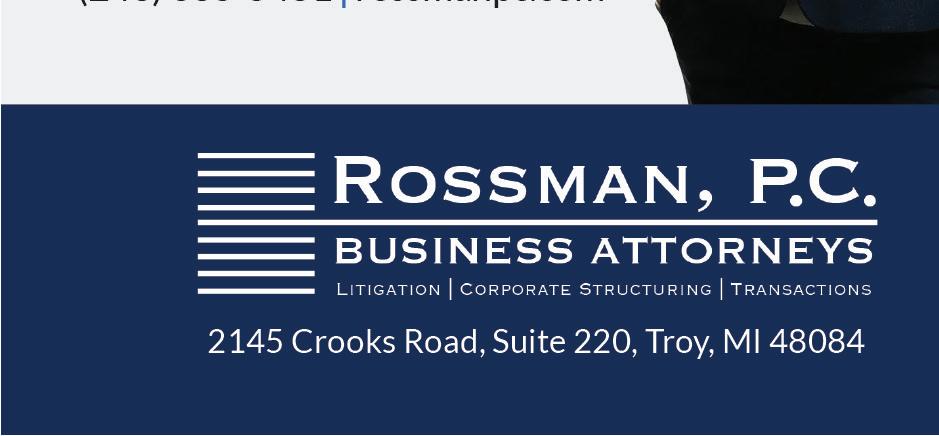
Divorce Mediation
In-person First Session Settlement Rate > 90% Court-Listed Domestic
Guardian Ad Litem Relations Mediator and Qualified Arbitrator
• Fellow of the American Academy of Matrimonial Lawyers

• Michigan Super Lawyer from 2012 – present
• Life Fellow of the Oakland County Bar Foundation
• Martindale-Hubbell rated “AV Preeminent”









Expand Your Knowledge with These Great Seminars!

15 MIDC Updates 2025 (Noon – 1 p.m.)
A seminar for criminal defense appointed counsel
Presenter: Peter L. Menna, Esq., Chief Attorney, Oakland County Indigent Defense Services Office
This Zoom seminar will provide an overview of the Michigan Indigent Defense Commission. Hear how Oakland County is implementing all current MIDC standards, including 6 and 7, in the circuit and 52nd District courts!
Worth 1 hour of criminal and juvenile training credit for appointed counsel
17 Legal Writing for Beginners (11:30 a.m. – 1 p.m.)
A seminar for criminal defense appointed counsel
Presenters: Mark Cooney, Esq., Professor, Cooley Law School, and Parisa Sadrnia, Esq., Lewis & Dickstein
Join us for this informative seminar from legal experts! Feeling rusty or looking for guidance? This Zoom seminar will provide an overview of writing legal documents from motions to briefs. Q&A will follow the presentation.
Worth 1.5 hours of criminal and juvenile training credit for appointed counsel
23 Navigating the Intersection of Bankruptcy and Landlord/Tenant Law (5:30 – 7 p.m.)
A joint seminar from the Real Estate and Debtor/Creditor committees
Presenter: TBA
Join us for an insightful seminar hosted by the OCBA’s Real Estate and Debtor/Creditor committees, featuring a distinguished panel including a bankruptcy judge, a district court judge, and an expert attorney. This session will provide invaluable guidance on the formation of the landlord-tenant relationship; key considerations to address potential complications if one party files for bankruptcy; automatic-stay and strategic considerations; and the process of eviction in bankruptcy proceedings. Don’t miss this opportunity to deepen your understanding of the complex interplay between bankruptcy law and landlord-tenant issues.
8 Managing Life’s Trials (Noon – 1 p.m.)
MAY
A seminar from the OCBA Lawyer Well-Being Committee, Women Lawyers Association of Michigan, and Macomb County Bar Association
Presenter: Thomas Grden, M.S., SBM Lawyers and Judges Assistance Program
Moderator: Mary Aretha, Esq., Michigan Court of Appeals
Join us in recognizing Well-Being Week in Law! This program will highlight the unique mental health challenges attorneys face. Together, we’ll explore behavioral red flags and develop practical tools to address them. Let’s work to normalize mental health care in the legal profession and gain strategies for better managing the psychological pressures of being a lawyer.
20 404(b)/Notices (5:30 – 7:30 p.m.)
A seminar for criminal defense appointed counsel
Presenter: Michael J. McCarthy, Esq., Michael J. McCarthy, P.C.
Location: Oakland County Bar Association Office
This in-person seminar will provide an overview of MRE 404(b), which prohibits admitting character evidence of other crimes, wrongs, or acts. Join us for this in-depth discussion along with tips and tricks. Additionally, a Q&A session will follow. Worth 2 hours of criminal and juvenile training credit for appointed counsel
29 Legal Career Transitions: A View from Private Practice, the Corporate C-Suite, and the Prosecutor’s Office (11:30 a.m. – 1 p.m.)
A seminar from the Professional Development Committee
Presenter: TBA
Moderator: Linda Kennedy, Esq., Panagos Kennedy PLLC
Join us in debunking myths about what different types of lawyers do. The discussion will provide stories from attorneys who have transitioned in their careeers, plus information on transferrable skills and how to become more effective in your new role. Additionally, a Q&A session will follow.
Learn more and register at ocba.org/events


By Roger P. Meyers and Mahde Y. Abdallah
Michigan’s business court statute took effect in January 2013, and the specialized docket created thereunder is now in its 13th year. In human terms, the business court has become a teenager: coming into maturity but still learning and refining. In light of that milestone, we sat down with each of the judges who have served on the Oakland County Business Court to reflect on what has worked well so far, what might be improved, and what practitioners might expect over the next several years as the business court continues to evolve.
The Michigan business court statute was the culmination of nearly a dozen years of starts and stops, ranging from an enacted but unfunded “cyber court” to widely differing pilot programs in Kent, Macomb, and Oakland counties.1 The analysis and experimentation of those years ultimately led to the passage in October 2012 of a comprehensive new statute, codified at MCL 600.8031 to 8047, that took effect January 1, 2013.2 Colloquially, the statute created “business courts,” but this term formally refers to specialized dockets within the circuit courts for circuits having at least three circuit judges.3
The goals of the business courts are to “[a]llow business or commercial disputes to be resolved with the expertise, technology, and efficiency required by the information age economy” and “[e]nhance the accuracy, consistency, and predictability of decisions in business and commercial cases.”4 Consistent with these goals, the business court is envisioned as a place to explore and develop new “judicial structures that will help all court users by improving the efficiency of the courts.”5
Business courts have jurisdiction over “business or commercial disputes” that seek equitable or declaratory relief, or otherwise meet circuit court jurisdictional requirements.6 The business court statute defines business and commercial disputes.7 Qualifying disputes can be summarized as having two characteristics: First, they are brought either between business enterprises or between a business enterprise and persons who have ownership, management, competitive, or similar relationships with the enterprise (and the dispute arises out of such relationships).8 Second, they involve claims arising out of businessfocused subject matters, such as mergers, organizational governance, commercial transactions or other business dealings, and so on.9 The statute expressly carves out certain disputes, such as employment discrimination, consumer insurance, and landlord-tenant disputes, even if they otherwise meet the general definition.10 A case in which part of the action does include a business or commercial dispute must be assigned to the business court even if it also involves claims — including otherwise excluded claims — that are not business or commercial disputes.11
The Michigan Supreme Court appoints judges to six-year terms on the business court.12 In Oakland County, the Supreme Court assigned the Hon. Wendy Potts (ret.) and the Hon. James Alexander (ret.) to serve as the court’s first two business court judges.13 The Hon. Martha Anderson served on the docket from 2019 to 2022, following Judge Potts’s retirement. The current business court judges, serving since 2020 and
2022 respectively, are the Hon. Michael Warren and the Hon. Victoria Valentine. Each of these five jurists graciously gave their time and wisdom, without which this article would not have been possible.
Practice in the business court differs in notable ways from general civil practice. Some of these can be seen from the outset. Unlike the general civil docket, where a standardized scheduling order is typically generated automatically, the business court judges unanimously take a more active and collaborative role in managing newly filed actions. “In tort cases, the lawyers often don’t talk until the end,” Judge Alexander explained. To change that, he and Judge Potts began scheduling interactive case management conferences to “get them talking” and “give them some say” in their schedule. That practice continues today: “An early case management conference helps attorneys streamline the case,” commented Judge Valentine. Judge Warren agreed, saying he trusts lawyers to exercise good faith in proposing scheduling orders because they “know how much time they need.” Judge Anderson found the practice so valuable that she took it back to the general civil docket when her term on the business court ended.
The case management conference also enables the judge to explore whether early alternative dispute resolution is appropriate. “The business court bar is much more amenable to facilitation and resolving cases, because for the most part, the cases involve a business decision and cost-benefit analysis of facilitation versus going to trial,” stated Judge Warren. “The concept was, the quicker the parties come together, the quicker the case resolves,” Judge Alexander elaborated. Nevertheless, even business court disputes can be emotional, and “sometimes the parties need to get in front of a judge,” pointed out Judge Valentine, who supports mediation if the parties want it but does not order mediation automatically.
Another significant difference in business court practice is the degree of specialization.

While judges typically are generalists who see a wide range of disputes, the narrower focus of the business docket allows business court judges to develop deeper familiarity with the issues that come before them. “Litigators appreciate that judges have become experts in the field,” says Judge Warren. “When you have that expertise, you can rest assured that judges are familiar with the subject area, are well versed, have seen the issues before, and have a sense of how the proceedings should go.” Judge Alexander agrees, noting that the statutory goal of creating consistency and expertise among business court judges “absolutely has occurred.”
This is not to say that business court judges only see business disputes. In Oakland County, each judge also oversees a full load of criminal cases.14 The judges broadly agreed that such a mixed docket presents unique challenges. For example, criminal cases take precedence over other cases, including older business cases set for trial. This can inject complications and disruption into scheduling. Yet the judges also generally enjoy having a mixed docket and felt that changing to a business-only docket would be very difficult to accomplish.
The nature of the business docket itself adds still more complexity. Judge Valentine observed that a disproportionate number of applications for temporary restraining orders and motions for preliminary injunction are filed in the business court. Judge Warren concurred, describing the volume as “exponentially higher,” and Judge Anderson estimated that one or two temporary restraining orders were virtually guaranteed to arrive every Friday afternoon. But the judges recognized such motions, though they can be disruptive, often play an important role in helping to resolve a case.
Meanwhile, the judges unanimously emphasized the vastly greater extent of dispositive motion practice in business court. Some of their feedback may be eye-opening for practitioners. Judge Anderson described a “steady diet” of motions brought under MCR 2.116(C)(8), and while recognizing the challenge posed by client expectations, Judge Valentine cautioned that many such motions are “tactical but not helpful” to the court. Judge Alexander shared that view, estimating that “in 90% of motions for summary disposition, there’s a fact question.” Compounding the problem of increased volume, the typical business court dispositive motion is also lengthy, is supported by extensive exhibits, and requires more research before decision than is seen in the civil docket. And, even where relief is granted, leave to amend is often required — thus starting the cycle anew. Judge Potts notes that it is an “intense” challenge to “handle the business docket properly” with these competing demands.
One concrete measure of the business court’s

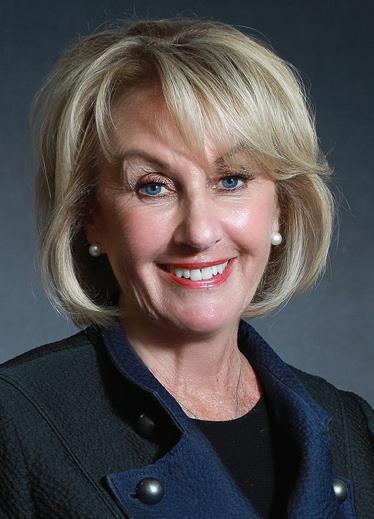



success is the increased willingness of parties to have a judge, rather than a jury, decide their case in the rare event that it proceeds to trial. Judge Anderson “definitely” saw fewer jury demands in her business court cases than her general civil cases. Judge Warren reported a “heavy disposition” toward bench trials. And Judge Alexander pointed out that “if you have a sophisticated business case and have to spend the first three days educating a jury, it’s a problem.” Court statistics support these subjective observations: An Interactive Court Data Dashboard provided by the State Court Administrative Office reveals consistent parity, year after year, between bench and jury trials in the business court.15 In comparison, general civil cases are tried to juries at roughly triple the rate of bench trials.16
That reduced rate of jury trials (atop the already low rate of trials in any form) may come at a cost, however. Judge Valentine said that while the overall “quality of the lawyers is amazing,” they may be “a little out of practice” and can come across as “a little too savvy and scholarly” in front of a jury. Judge Warren echoed that view, emphasizing that business court lawyers excel in motion practice but are less clear on how to effectively present a case to a jury.
In general, however, the judges were uniformly impressed with the advocacy in the business court. Judge Potts complimented both the professionalism and the “excellent” work product, while Judge Alexander appreciated that the “level of lawyering was high” and “made our job easier.” And Judge Valentine appreciated the complexity of the practice and the strategy and analysis that goes into it, noting that “the thick of litigation is in the business court.”
III. WHAT WORKS WELL AND WHAT CAN BE IMPROVED
In the early years of the business court, there were concerns of both over- and under-inclusiveness
in the jurisdiction established under the business court statute. The statute was amended in 2017 to address these issues, resulting in expansion of jurisdiction for certain types of claims involving individuals — such as guarantors of commercial loans — but also exclusion of other types of claims even when brought solely between business enterprises.17
The judges universally viewed that amendment as having largely succeeded in striking the right balance between cases that belong in the business court and those that do not. Judge Warren views the jurisdictional scope as “close to stability.” Judge Anderson likewise believes that most cases are going to the docket, business or civil, where they ought to be. Judge Potts confirmed that the 2017 amendment “really helped” strike the right balance. And Judge Alexander summed up, “Overall, [the statute] is doing its job. … If it ain’t broke, don’t fix it. And I don’t think it’s broken.”
That said, the judges generally agree there still is some room for fine-tuning. In particular, they consistently mentioned three categories of cases they feel should, but currently do not, fall clearly within business court jurisdiction. The first category involves proceedings supplementary to judgment in an underlying business court case, where the court already is familiar with the parties and the dispute. The second category involves cases where one party is a municipal corporation or other governmental entity, which circumstance has led to inconsistent jurisdictional decisions from business court to business court. The third category includes cases dealing with internal business affairs, such as derivative suits, in which the underlying entity has not been named as a party. The State Bar of Michigan’s Business Courts Committee is working to develop legislation to address many of these issues.18
A bigger shared concern, and one that may be more difficult to solve, is capacity. Judge War-
ren noted that the “demands on judges” — both business court and otherwise — “are much higher now” than when he first took the bench two decades ago. But these demands fall particularly hard on the business court. Under the statute, the judges are expected to publish written opinions to a searchable statewide database.19 Judge Potts notes, however, that it is “staff intensive” to prepare opinions in the face of the business court’s outsized volume of motions. Judge Anderson agreed, calling the task “daunting.” Statewide utilization studies are underway to evaluate whether a sufficient number of judges have been allocated to each business court, but in Judge Warren’s view, there is no question that the Oakland County Business Court is “underjudged” with only two judges to carry the load.
Our legal system is in a time of rapid change, and the business court is no exception. In looking at what may be just over the horizon for the business court in the next five to 10 years, the judges offered a handful of predictions and ideas.
Judges Potts and Valentine both expressed concern about the challenge of relatively smaller business disputes, which are difficult to resolve in a cost-effective manner, and the need for a method to “fast-track” such disputes with streamlined procedures. Judge Valentine also emphasized the need for lawyers to work collaboratively to address increasing discovery and evidentiary issues relating to metadata. Judge Alexander reiterated the need to shift back to in-person hearings for substantive matters, reserving Zoom for routine matters. Judge Potts sees an increased role for prelitigation alternative dispute resolution, given the continued increase in cost of litigation. And several judges remarked that the searchability of the business court opinion database needs improvement to make it a more useful tool.
What emerges from these predictions and
suggestions, however, is a sense of refinement and continuous improvement, rather than any need for a major overhaul. e business court is in its teen years now, and as summarized by Judge Alexander, it is “aging well.”


Roger P. Meyers is a member at BSP Law and leads the rm’s complex business and commercial litigation practice. He routinely handles disputes involving business ownership, corporate acquisitions, commercial contracts, director and o cer liability, business torts, class actions, health care, and trade secret matters. He repeatedly has been recognized as a “Super Lawyer” by Michigan Super Lawyers and is a member of the OCBA’s Business Court and Counsel Committee. Meyers also serves on the boards of
directors for the Detroit Bar Association and the Michigan Science Center and is a frequent writer and presenter on business litigation topics.

Mahde Y. Abdallah is a senior associate at BSP Law. He litigates complex commercial, tort, and class action cases in federal and state courts for clients ranging from global manufacturing companies to private individuals. Abdallah has been recognized as a “Rising Star” by Michigan Super Lawyers since 2020 and was included in the Best Lawyers in America’s 2025 list of insurance litigation attorneys.
Footnotes:
1. See generally Douglas L. Toering, The New Michigan Business Court Legislation: Twelve Years in the Making, available at https://www.businesscourtsblog. com/wp-content/uploads/2019/01/New-Michigan-
Business-Courts-2013-01552036xB05D9.pdf.
2. 2012 PA 333.
3. MCL 600.8031(1)(a); MCL 600.8033(1).
4. MCL 600.8033(3).
5. Id.
6. MCL 600.8035(1).
7. MCL 600.8031.
8. MCL 600.8031(1)(c).
9. MCL 600.8031(2).
10. MCL 600.8031(3).
11. MCL 600.8035(3).
12. MCL 600.8037(2).
13. Order, ADM File No. 2012-36, April 3, 2013.
14. In Wayne County, conversely, business court judges oversee a mixed business and general civil docket.
15. See https://www.courts.michigan.gov/publications/ statistics-and-reports/interactive-court-datadashboard.
16. See id
17. 2017 PA 101.
18. https://higherlogicdownload.s3.amazonaws.com/ MICHBAR/ebd9d274-5344-4c99-8e26-d13f998c7236/ UploadedImages/Bus_Courts.pdf.
19. MCL 600.8039(3).


By Jehan Crump-Gibson
Disputes in the business and commercial context are a tale as old as time. The uptick in these types of disputes was a driving force in the adoption of Michigan’s business court legislation, which created “business court.” Since the legislation took effect in 2013, qualified business and commercial disputes have been assigned to a specialized docket within the circuit courts. There is no shortage of shareholder and member disputes involving closely held corporations and limited liability companies on those dockets. This article will focus on common disputes involving these types of entities and applicable rulings.
In an ideal world, individuals who form corporations and limited liability companies (LLCs) carefully craft bylaws and shareholder agreements or operating agreements that will, among other things, govern rights and responsibilities of the parties and dispute resolution. The provisions in these agreements may or may not deviate from what the applicable statutes call for. Even when these agreements exist, though, bad behavior on the part of owners with a controlling interest in the business often precipitates disputes that the documents cannot resolve. The most common behavior that lands parties in business court in this context includes (but is not remotely limited to) misuse of company funds, denying access to corporate books and records, dilution of minority equity interests, failure or refusal to issue distributions or dividends (and in some cases diverting those funds to controlling owners), removing minority shareholders from management, freezing shareholders out of the company, withholding information, holding meetings without members’ or shareholders’ knowledge, and diverting corporate opportunities and assets to other entities. This behavior commonly leads to shareholder or member oppression claims.
To prove shareholder oppression under MCL 450.1489, a shareholder needs “to establish that the acts of the directors or those in control of the corporation are illegal, fraudulent, or willfully unfair and oppressive to the corporation or to the shareholder.” Willfully unfair and oppressive conduct is further defined as “a continuing course of conduct or a significant action or series of actions that substantially interferes with the interests of the shareholder as a shareholder.” The Michigan Court of Appeals has elucidated standards trial courts should use when considering shareholder oppression claims. Specifically, the court has held that “with regard to acts that are willfully unfair and oppressive, the complaining shareholder must prove that the directors or persons in control of the corporation engaged in a ‘continuing course of conduct’ or took ‘a significant action or series of actions’ that substantially interfered with the interests of the shareholder as a shareholder and that they did so with the intent to substantially interfere with the ‘interests of the shareholder as a shareholder.’” MCL 450.1489(1); MCL 450.1489(3); Franks v. Franks, 330 Mich. App. 69, 98–99, 944 N.W.2d 388, 404 (2019). Accordingly, a defendant can avoid liability by showing that they did not have the requisite intent when they took the acts that interfered with the shareholder’s interests.
This means only showing harm to minority shareholders will not suffice. Evidence to prove
the wrongdoers’ injurious intentions must be introduced. Intent can be proved with circumstantial evidence. This intent requirement has proved to be fatal to shareholder oppression claims. The court also held in Franks that the controlling owners cannot hide behind the business-judgment rule — which has historically been invoked to fend off oppression claims. Ordinarily, Michigan’s business-judgment rule protects corporate directors for honest mistakes in judgment — if they act with loyalty and due care. After the Franks ruling, the rule will not insulate corporate directors or controlling owners when it is determined that decisions were taken not for legitimate business reasons but to harm the shareholders. The court held that a shareholder overcomes the business-judgment rule by presenting evidence to establish the elements of a claim under the shareholder oppression statute because that statute identifies wrongful conduct and provides a remedy for it. Reed v. Burton, 344 Mich. at 130–131, 73 N.W.2d 333; see also Wayne Co. Prosecuting Attorney v. Nat’l Mem. Gardens, 366 Mich. 492, 496, 115 N.W.2d 312 (1962) (stating that the business-judgment rule applies only “where there has been no fraud, misconduct, or abuse of discretion by the officers and directors”). Id at 69, 100–101.
The LLC companion to shareholder oppression is codified in Michigan’s Limited Liability Company Act, MCL 450.4515. Under MCL 450.4515, a minority member must show that the person or persons in control of the LLC have engaged in conduct that is “willfully unfair and oppressive.” The actionable conduct, as with shareholder oppression claims, can vary. The same standard set forth in Franks applies with respect to the business-judgment rule.
The landscape has changed in recent years for breach of fiduciary duty claims. Corporate officers and directors owe both common-law and statutory fiduciary duties (under the Michigan Business Corporation Act) to shareholders. Consequently, breach of fiduciary duty claims are quite common with closely held entities. After a significant ruling in 2022, corporate officers and shareholders in Michigan can be sued directly for breach of fiduciary duty. In Murphy v. Inman, 507 Mich. 906 (2022), the Michigan Supreme Court held that shareholders have the right to bring a direct action against the officers and directors not in the name of the entity. The court adopted framework from a Delaware Supreme Court ruling, holding that shareholders may proceed with these actions when the following is demonstrated: (1) The shareholder, not the corporation, has suffered the harm that is alleged, and (2) the shareholder, not

the corporation, would receive the benefit of any recovery or other remedy. This certainly opened the floodgates for direct claims. Previously, Michigan case law presumed that claims belonged to the corporation, and as such, derivative actions (where the corporation is harmed and would receive recovery) were required unless one of two exceptions was satisfied: (1) The shareholder suffered separate and distinct harm from other shareholders, or (2) there was a violation of a duty owed directly to the shareholder.
After the Murphy ruling, the standard is: If the corporation is harmed and would benefit from recovery or remedy, the action is derivative. If the shareholder suffers the harm independent from the corporation and receives the remedy rather than the corporation, the action is direct.
When the parties have executed a shareholder agreement or operating agreement, breach of contract claims are common when wrongful conduct is alleged. As with any other breach of contract action, a breach of a shareholder agreement or bylaws in the context of a corporation can involve various actions or omissions by directors or shareholders that violate the terms of the agreements. Likewise, a breach of an operating agreement in the context of a limited liability company can involve the same with respect to members and managers.
Common actions that give rise to breach of contract claims with closely held entities include failing to follow delineated procedures when voting a member or shareholder out; failing to make distributions as called for in the relevant agreement; challenging the enforceability of arbitration clauses; and failing to participate in capital calls when issued. A number of these matters ultimately require courts to focus on contract construction to determine the parties’ intent or contract interpretation to determine the parties’ respective rights and obligations and to make
the determination as to whether the contract is ambiguous.
There are statute of limitations issues that may arise with the aforementioned claims: When does the claim accrue? What if the harm is discovered later? What if there are continuing wrongs? Generally, unless there is a specific statutory provision that provides for tolling of the statute of limitations under particular circumstances, a claim accrues when all of the necessary elements of a cause of action have occurred and can be alleged in a proper complaint. However, there are divergences which depend on the cause of action.
For example, in the context of member oppression, “it is … the fact of identifiable and appreciable loss, and not the finality of monetary damages, that gives birth to the cause of action.” Luick v. Rademacher, 129 Mich. App. 803, 806, 342 N.W.2d 617 (1983). This means that the claim accrues when the interests of the member are substantially interfered with — regardless of whether calculable monetary injury has occurred. Once that claim accrues, the statute begins to run. An action seeking an award of damages must be commenced within three years after the cause of action under this section has accrued, or within two years after the member (or shareholder in the case of shareholder oppression) discovers or reasonably should have discovered the cause of action under this section, whichever occurs first. This provides for tolling on the basis of discovery and is referred to as the discovery rule. Keep in mind — for the discovery rule to apply, it must be covered by the applicable statute.
With breach of fiduciary duty claims, the statute of limitations is three years from the date the cause of action accrued. If the plaintiff discovers the cause of action later, the statute of limitations is two years from the date of discovery. This provides for tolling on the basis of discovery. With breach of contract claims, there is a six-
year statute of limitations and there is no discovery rule. As such, claims accrue on the date of the breach, not when it is discovered. ere is no tolling. Notably, if payments due under an applicable agreement are of a periodic nature or installments, claims “accrue as each installment falls due.” MCL 600.5836. For installments, the period of limitation runs separately for each installment. Sparta State Bank v. Covell, 197 Mich. App. 584, 587, 495 N.W.2d 817 (1992). For claims of a periodic nature, a cause of action accrues each time payment comes due. H.J. Tucker & Assoc. v. Allied Chucker & Eng’g Co., 234 Mich. App. 550, 562–563, 595 N.W.2d 176 (1999).
Many times, aggrieved shareholders and members seek relief in tort — e.g., conversion, fraud, etc. If there is a shareholder agreement or operating agreement, in steps the Economic Loss Doctrine to quell dreams of recovery under these causes of action. e Economic Loss Doctrine provides that a “party is barred from recovering economic losses in tort, where those losses were suffered because of a breach of duty assumed only by contract.” Neibarger v. Universal Coops., 439 Mich. 512, 525–526, 486 N.W.2d 612 (1992); Fultz v. Union-Commerce Assocs., 470 Mich. 460, 467, 683 N.W.2d 587 (2004). “As a general rule, there must be some active negligence or misfeasance to support tort. ere must be some breach of duty distinct from breach of contract.” Tuttle v. Gilbert Manf’g Co., 145 Mass. 169, 174–175, 13 N.E. 465 (1887). By way of illustration, where fraud is alleged, it must be extraneous to the contract in order to cause harm distinct from that caused by the breach of contract. Huron Tool & Engineering Co. v. Precision Consulting Servs., 209 Mich. App. 365, 373, 532 N.W.2d 541 (1995) (internal citations omitted). Misrepresentations relating to the performance of a contract do not give rise to an independent cause of action in tort. Id. is precedent has significantly hampered aggrieved parties’ ability to pursue tort claims in the business dispute context — even in the case of an otherwise viable claim.
e conduct and claims discussed in this publication are what I call the “usual suspects.” is is not an exhaustive list of all potentially actionable claims in the business dispute context. ere are several more instances of conduct and other causes of action that aggrieved members and shareholders can bring. With recent court trends, there are more options for individual members and shareholders to seek recovery; however, practitioners should be clear on what is required to successfully advance these claims, when those claims accrue, and whether there is any tolling of an applicable statute of limitations.


Jehan Crump-Gibson is the co-founder and managing partner at Great Lakes Legal Group PLLC, where she concentrates her practice in business and commercial matters and probate and estate planning. Crump-Gibson has served as faculty for the Institute of Continuing Legal Education and the National Business Institute (NBI) concerning business, nonpro t, and probate and estate planning matters. She has been named to the Michigan Super Lawyers “Rising Stars” list 10 times and was recognized in the 2022 Michigan Lawyers Weekly Class of Leaders in the Law. Crump-Gibson was also appointed by U.S. Sen. Gary Peters to the Michigan Senate Judicial Advisory Committee, which vets candidates and makes recommendations to ll vacancies on the federal bench in the Eastern District.

Members of metro Detroit’s legal community say they trust the attorneys of Plunkett Cooney to assist them when professional liability and professional responsibility issues arise. Get the Plunkett Cooney perspective and protect your practice.
MICHAEL P. ASHCRAFT, JR.
Phone: (248) 594-8217 mashcraft@plunkettcooney.com
JEFFREY S. HENGEVELD
Phone: (248) 594-8202
jhengeveld@plunkettcooney.com

By Stephen A. Weisberg
Business tax debt is serious, and the penalties are severe. But there’s an important distinction between business income tax debt and business payroll tax debt: the possibility of personal liability.
I’ve represented hundreds of business owners over the last 10 years whose business had substantial payroll tax debt, which ultimately turned into taxes the business owner became liable for personally.
This article discusses payroll tax debt, the trust fund recovery penalty, how and when personal liability is assessed, and how it affects both the business and the business owner.
Payroll taxes include Federal Insurance Contributions Act (FICA) taxes — for Social Security and Medicare — as well as unemployment taxes. At scheduled time periods (biweekly, monthly, or quarterly), businesses are required to deposit payroll taxes with the IRS and file quarterly payroll tax returns (IRS Form 941, along with IRS Form 940 annually).
The payroll tax is divided into two distinct parts:
• FICA taxes, including Social Security and Medicare, and unemployment taxes which the employer is required to pay for their employees; and
• FICA taxes, including Social Security and Medicare, and income taxes the employee is required to pay, which are withheld from the employee’s paycheck. This part is called the “trust fund” portion.
The trust fund portion of payroll tax debt is called this because the funds are withheld from the employee’s paycheck and held by the business in “trust” to pay to the IRS on the employee’s behalf. In other words, the trust fund portion is not the business’s money — it’s the employee’s.
Business owners are constantly balancing priorities to ensure operations run smoothly, employees are paid, and vendor relationships remain intact. But what happens when cash flow dries up and vendors refuse to deliver materials until they’re paid? Without those materials, the business can’t continue to operate.
What options does the owner have?
Borrow money?
Put personal funds into the business?
Close the doors completely?
This is when risky decisions are made, including using the trust fund portion of the payroll taxes to pay vendors instead of the IRS Business owners assume they will replenish the funds once their cash flow improves.
More often than not, they never do.
Despite the risks, some business owners still go down this path. When repayment becomes impossible, the result is payroll tax debt owed to the IRS, along with accumulating interest and penalties. But what business owners fail to grasp is that this decision doesn’t just endanger the business; it puts their personal finances on the line as well.
When payroll tax is delinquent, the IRS can assess the trust fund recovery penalty (TFRP)
to retrieve the delinquent taxes personally from individuals associated with the business in addition to from the business itself.
The trust fund recovery penalty is not actually a “penalty” at all, at least not in the traditional sense. It’s only called a “penalty.” Instead, it’s the trust fund portion of unpaid payroll tax assessed personally against someone or multiple someones at the business.
The IRS’s determination of personal liability in payroll tax cases is twofold: who was “responsible” for depositing the trust fund portion of the payroll taxes with the IRS and whether that person “willfully” did not do so.
Responsibility: A responsible person directs the collecting, accounting, and paying of the payroll taxes. When the debtor is a small business with few senior officers, the responsible person is generally the owner. That said, it can be anyone who is assigned to make sure the payroll taxes are paid. This may be an accountant, a comptroller, a corporate officer, or some other employee.
Once the revenue officer determines who was responsible for ensuring payroll taxes were deposited with the IRS, they must then determine whether that person “willfully” did not do so:
“The responsible person ... must have been, or should have been, aware of the outstanding taxes and either intentionally disregarded the law or was plainly indifferent to its requirements.”1
Intentionality is not required.
If funds were paid to creditors while payroll taxes remained unpaid, that’s an indication of “willfulness.”
When payroll taxes are owed, the business owner may be able to negotiate an installment agreement for the business through the IRS’s collections division if the assessed balance owed is under $25,000, but for any greater amount, a revenue officer will be assigned before the business can negotiate a formal resolution.
It’s the RO’s duty to review the business’s financials to make sure the IRS is paid what it’s owed as quickly as possible. It starts with an examination of equity in assets that can be liquidated or borrowed against to pay the IRS. Once that’s exhausted, the revenue officer looks for “disposable income” that can be used to pay down the balance. The disposable income determination results in an installment agreement where the business is required to make a payment to the IRS monthly.
Here’s the important part, though: If the business lacks sufficient equity to pay the delinquent tax, even if it is making monthly payments, the IRS then begins to look at individuals associated with the business who can be assessed with personal liability using the trust fund recovery penalty.
Once the business resolves its payroll tax debt and the TFRP is assessed against the individual(s) responsible for the trust fund portion, individual collection efforts begin.
Once again, the IRS begins by reviewing equity in assets. If there’s not sufficient equity to pay off the TFRP, an installment agreement can be negotiated based on the individual’s income and expenses determined using IRS standards.
Let’s say the employer’s payroll tax responsibilities are $100,000 and, just by way of example, the business was responsible for $20,000 and withholds $80,000 from the employees’ checks — i.e., the trust fund amount. None of it has been paid to the IRS.
The business has liability for the full $100,000 owed. The individual, however, is only held personally liable for the $80,000 trust fund portion.
Once the business and the individual(s) held personally liable are in a resolution for the outstanding payroll taxes and the trust fund recovery penalty simultaneously, both must pay the IRS for the back payroll taxes at the same time. The business is required to pay down the payroll taxes owed, along with current payroll taxes coming due, and the business owner (or other individual assessed the TFRP) must concurrently pay the trust fund recovery penalty.
To be clear, the IRS is only entitled to payment of the total payroll taxes owed. In other words, the IRS cannot collect the full TFRP and the full payroll tax liability. As the TFRP is paid down, the corresponding trust fund portion of the payroll taxes owed by the business is reduced in kind.
Nevertheless, in some cases, this is simply too much for the business owner to handle, and the business is ultimately forced to shut down.
Because of the potential for personal liability due to the trust fund recovery penalty, business
owners must understand the importance of depositing payroll taxes as they become due. ere are going to be times when cash flow is tight, and it may seem like paying a vendor is more important than paying payroll taxes. It’s not. As the business owner, you’re very likely going to be assessed with personal liability.
In the event, however, you’re past that point and payroll taxes are already unpaid and delinquent, there are strategies any business owner should use to resolve the payroll tax debt, protect against enforced collections, and protect themselves personally.
Payroll Tax Debt Strategies
1. Acknowledge the Problem and Act Quickly
• Why it matters: Delayed action increases penalties and interest and may escalate IRS enforcement actions, like liens or levies.
• What to do: Even if unable to pay payroll taxes in full, file the 941 quarterly payroll tax returns timely and pay as much as possible.
2. Separate Trust Fund and Non-Trust Fund Payroll Taxes
• Why it matters: Payroll tax includes two components: the trust fund portion (employee withholdings) and the employer’s share.
• What to do: Once it becomes clear that payroll tax payments are going to be delinquent, voluntary payments should be made. Importantly, explicit instructions must be provided to the IRS to apply these payments to the trust fund portion of the payroll tax first to reduce the potential personal liability of the business owner down the road.

3. Address the Underlying Cause
• Why it matters: If the root cause of the payroll tax debt isn’t resolved, the problem is likely to recur.
• What to do: Evaluate cash flow management, billing practices, and operational inefficiencies. Implement systems to ensure payroll taxes are paid on time, such as automated payroll services or dedicated escrow accounts.
4. Protect from Personal Liability
• Why it matters: Under the TFRP, individuals responsible for collecting, accounting for, and paying payroll taxes can be personally liable for unpaid trust fund taxes.
• What to do: Avoid commingling funds and document efforts to resolve the debt. If not directly responsible for payroll, maintain clear records to show you acted responsibly.
5. Communicate with the IRS
• Why it matters: Proactive communication can prevent enforcement actions and demonstrate good faith in resolving the debt.
• What to do: Respond promptly to IRS notices and cooperate during audits or inquiries. is shows you’re committed to resolving the issue.
6. Stay Current
• Why it matters: e IRS will only work to resolve past-due payroll taxes with businesses that meet current payroll obligations. If you’re not in compliance, IRS-enforced collections will continue.
• What to do: Ensure all future payroll tax deposits are made on time. Create a system for real-time tracking of deposits and filings.
At the firm’s recent annual meeting, the partners of Plunkett Cooney reelected three colleagues to its board of directors to serve three-year terms, among whom are two OCBA members, Jeffrey S. Hengeveld and Patrick C. Lannen
Hengeveld, who serves as co-leader of Plunkett Cooney’s Professional Liability practice group, focuses primarily on defending professional liability claims brought against attorneys, accountants, and broker-dealers and related ethics and licensing actions. He also represents clients in class action litigation. A member of the firm’s Bloomfield Hills office, Hengeveld is licensed to practice in all Michigan state and federal courts.
Resolving payroll tax debt requires swift, strategic action and careful planning to avoid longterm business and personal consequences.

Links:
1. “Employment Taxes and the Trust Fund Recovery Penalty,” irs.gov/businesses/smallbusinesses-self-employed/employment-taxes-andthe-trust-fund-recovery-penalty-tfrp.
2. “Understanding Employment Taxes,” irs.gov/ businesses/small-businesses-self-employed/ understanding-employment-taxes.

Stephen A. Weisberg is the founder and lead attorney of e W Tax Group.
Weisberg represents individuals, businesses, and business owners nationwide with IRS and state tax debt and controversies, including payroll tax and the trust fund recovery penalty, and audits.
He has an in-depth understanding of the Internal Revenue Manual, with a keen grasp of the technical and practical procedures of the IRS. He takes great pride in providing his clients comfort during a highly stressful time.
Weisberg is a graduate of the University of Michigan and earned his law degree from the Loyola University Chicago School of Law.
Footnote:
1. “Employment Taxes and the Trust Fund Recovery Penalty,” irs.gov/businesses/small-businesses-selfemployed/employment-taxes-and-the-trust-fundrecovery-penalty-tfrp. See also “Could You Be Personally Liable for Certain Unpaid Federal Taxes?,” irs.gov/ pub/irs-pdf/n784.pdf.

Lannen is a partner in the firm’s Bloomfield Hills office and leads the Commercial Litigation practice group. An experienced trial attorney, he has played an integral role in the growth and success of the firm’s high-stakes, bet-the-company commercial litigation practice. He is widely recognized for handling complex commercial and financial services litigation; banking and creditors’ rights matters; and class, mass, and multidistrict actions.
1/27/2025
2024-290065-FH
People v. Randle
2024-290096-FH People v. Pernell
Sumeet Aggarwal
George Chedraue
Sumeet Aggarwal
Richard Taylor
Stolen Property Receiving/ Concealing $20K+
1/27/2025
Brennan
Matis
Valentine Brennan
Warren
Warren
Ronayne
KrauseVisiting Judge
2024-288551-FH People v. Granger
2024-289916-FH People v. Hall-Powers
2024-287919-FC People v. Scribner
2024-206052-NO
Janice Roble v. Thomas Kelly
2024-290589-FH People v. Whetstone
2023-286283-FH
People v. Anthony
2023-283177-FC People v. Austin
2023-199795-CB
Detroit IT v. LS Investment Advisors
2023-285727-FC
People v. Palacios
Stephen Frey
Robyn Kennedy
Andrew McGarrow
Carl Jordan
Marissa Fillmore
Mark Satawa
Christopher Hunter
Loren Blum, Andrew Elder
David Hutson
Douglas Kolly
Nicole Garmo
Larry Smith
Ricardo Polanco
David Steingold
Ian Bolton J. Sriro, B. Low, A. Boey
Stephen Frey Alona Sharon
Cts. 1-5 3rd Degree CSC (Incapacitated Victim)
Cts. 1-3 1st Degree CSC (U/13)
Officer Assault/ Resist/Obstruct Causing
C/S Del./Manf. <25 Grams, Weapons Felony Firearm
Murder, Weapons Felony Firearm
Cts. 1 & 2 CSC 1st Degree, Cts. 3 & 4 CSC 2nd Degree (Relationship)

By Justin Gonzales

My goal with this essay is to provide some guidance for new attorneys. Hopefully, my experience will illuminate some issues you may be facing or having difficulty with.
The first couple of years of being a new lawyer can be challenging for many. While law school gives you a basis to build on, it does not prepare you for the actual practice of law. Many young attorneys face challenges unique to the legal profession. Most people will never have to face their fear of public speaking, work with potentially dangerous people, help those who have suffered greatly, or work with clients at the end of a difficult marriage. While the job of a lawyer may seem simple, its complexities span the gamut from family law to criminal law to contract law. What has helped me in my practice is a phrase my dad told me when I joined the U.S. Army, “Keep Moving Forward.”
Both my father and I served in the U.S. Army during the Iraq and Afghanistan wars. We both were deployed in combat roles. My father served tours in Iraq and Afghanistan, and I served my tour in Iraq. We both served with honor and returned home safely. When I graduated from infantry school, my father told me, “No matter what happens, keep moving forward.” I have always kept that in my mind as I continued down my path in life.
As a new lawyer, I faced many unique challenges, but I always remembered “Keep Moving Forward.” My first year and a half of practice was in criminal law. I worked on
both sides, first as a public defender and later as a prosecutor. The challenges I faced in those roles were diverse and new. After my foray into criminal law, I decided to try civil litigation. I ended up working for Cardelli Lanfear PC. The civil side has provided me with new experiences and helped refine my all-around legal knowledge and education.
First, you will need to learn how to work with clients who find themselves in tough situations. It is not easy telling someone that 10 years in prison is a good deal. Working with them and learning to build rapport to help build their confidence in you is critical when working with a client. That is the first lesson I learned on the job, and it’s a critical skill. When
a client doesn’t trust you, it makes your job 10 times more difficult. A simple return phone call can be the difference between a happy client and an unhappy client. It is easy to forget that other people are not used to the legal system; this might be their first time. We practice law every day — make sure that your client understands that you are there for them, whether that be a criminal defendant or a victim of a crime. Simply talking to them and explaining can help assure them they will be OK.
Second, you will need to learn how to manage time and plan your work schedule, including reducing it to writing in physical or electronic form. “Time is money” is a cliché but true in our profession. Make sure you keep a good work calendar — e.g., all your hearings are marked down, all motions and deadlines are set with dates and reminders. I cannot stress enough that being late or missing deadlines is very bad. Cases can be won or lost because a lawyer missed a deadline. Your work calendar should be one of your most important and familiar tools as you practice law. Keeping a good calendar can help when you work on similar cases or visit clients who are close together. As a public defender, visiting clients who were incarcerated was part of the job. Whenever I had to visit one client, I would always run through my client list and calendar and see if I could visit more than one client so I would save a trip.

Third, learning how to proofread is critical. It may seem simple enough to proofread all your work, but when
you are drafting large motions for summary disposition, facilitation briefs, case evaluations, and other legal documents one after the other, it can become difficult and time consuming. I cannot overstate how important it is to proofread. Nothing sounds better than a judge telling you how well a brief was written; nothing is worse than a judge stating you misspelled or mislabeled exhibits. It is embarrassing and reflects poorly on all your hard work. It also undermines a judge’s belief in you, which they require if they are going to follow the relief requested in your motion or response. ink of it this way: Would you believe the person with a wellwritten motion or the person with multiple errors and incorrect citations or exhibits? Judges have a reputation, too, and they put it on the line when you ask them to follow your motion. I would strongly recommend building a system that helps you proofread. I personally read everything out loud, and I find that is the best way to identify incorrect spellings and proper
word choice. If it doesn’t sound good when spoken out loud, then it probably needs to be changed. I also print large briefs or motions out and run through them with a red pen. It helps to see it on paper, and on occasions where something is mislabeled or misspelled, I find it immediately.
Fourth, you will have challenging cases. No matter how hard you try, work, plead, write, or argue, a case will go south on you. is is where my father’s words come in: “Keep Moving Forward.” You will have rulings that you don’t agree with. You will have an adverse jury result. You will have a client who does not understand your reasoning or is difficult to deal with. You will have difficulties with co-workers. You will have opposing counsel insult you or mistreat you. All these issues will happen. Remember to “Keep Moving Forward.” ere is no greater satisfaction than proving you can go beyond those difficulties and come out on the other side better. I kept moving forward. It wasn’t







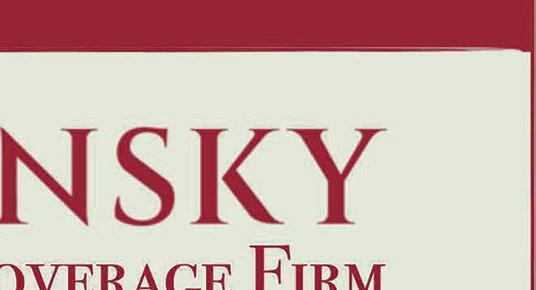


easy. If I did not have my mentors and family, I do not know if I could have.
Looking back, I have worked as a lawyer for almost three years, and it was tough. Yet, those tough times did prove fruitful. I own a home and have paid off my student loans. I work at a place where I genuinely love coming to work. My advice to new lawyers in Oakland County is this: “Keep Moving Forward.”

Justin Gonzales has been an attorney since June 2022. He has worked as a public defender, assistant prosecutor, and associate attorney. Currently, he is working for Cardelli Lanfear PC as an associate attorney. Gonzales has years of experience working with the 41B District’s veterans court and is currently the pro bono defense attorney for the 45th District Court Veterans Treatment Court. Other a liations of his include council member in the SBM Insurance and Indemnity Law Section, director of new lawyers for the OCBA, and vice chair of the OCBA Veterans Committee.
Located in the award-winning Kaufman Financial Center in Farmington Hills. One to five private office spaces, with staff cubicles, are available for immediate occupancy. The lease includes the use of several different sized conference rooms, including a conference room with dedicated internet, camera, soundbar and a large monitor for videoconferencing; reception area and receptionist; separate kitchen and dining area; copy and scan area; and shredding services.


Oakland County, Michigan, has seen a remarkable increase in the caseload and trial activity within its business court over the past few years. From 2022 to 2024, there was a noticeable surge in both the number of new filings and the number of trials heard in this specialized court. As businesses and individuals continue to engage in complex litigation, the demands placed on the court have also escalated, prompting judges to balance a heavier workload while maintaining an efficient and fair judicial process.
The Oakland County Business Court is designed to handle business-related legal disputes, including contract breaches, corporate governance issues, and other commercial litigation. Over the past three years, the number of new cases filed in the business court has steadily increased, reflecting a broader trend in Michigan’s legal landscape. In 2022, the court saw 806 new filings. By 2023, that number had climbed to 916 filings. In 2024, the court exceeded 1,000 new filings, with 1,067 cases, signaling an ongoing uptick in businessrelated litigation within Oakland County. As of January 30, there have been 97 CB cases filed in 2025.
A striking increase in recent years is partially attributable to the marijuana industry and pandemic-related litigation. As Michigan’s legal cannabis market has boomed in the wake of state legalization, the business court has become a critical venue for resolving disputes involving marijuana businesses. These disputes often involve complex issues such as contractual disagreements, business breakups, construction disputes, and financial disputes among stakeholders. The business court also saw an increase in litigation related to the pandemic, especially in the areas of lease disputes and force majeure clauses, as well as breach of contract cases related to the supply
By Judges Victoria Valentine and Michael Warren
of COVID-related products such as masks and gloves.
This increase can be attributed to several factors. The global economy has faced challenges in recent years, including supply chain disruptions, labor shortages, and economic uncertainty. These factors often give rise to business disputes, from contractual disagreements to issues surrounding mergers and acquisitions.
Another key trend in the Oakland County Business Court has been the increase in jury trials.
In 2022, the court handled seven jury trials, three assigned to Judge Anderson/Valentine’s docket1 and four assigned to Judge Warren. The following year, in 2023, the number increased slightly to eight jury trials, with six assigned to Judge Valentine and two to Judge Warren. By 2024, the number of jury trials had grown to nine, with five trials assigned to Judge Valentine and four to Judge Warren. In addition, both judges have conducted many evidentiary hearings involving, for example, motions to set aside defaults, awarding attorney fees, and similar matters.
In some cases, parties may feel that a jury of their peers would provide a more favorable outcome, especially in cases involving contentious allegations of fraud or wrongdoing. The increase could also suggest that parties are more willing to push for a trial rather than settle, perhaps due to changes in legal strategies or the current economic climate, where businesses may be more inclined to test the waters in court rather than reach settlements.
While jury trials have seen a steady increase, bench trials in the Oakland County Business Court have remained relatively stable over
the years. In 2022, the court saw seven bench trials, with three assigned to Judge Valentine and four to Judge Warren. The following year, 2023, recorded a slight decrease, with six bench trials (four to Judge Valentine and two to Judge Warren). However, in 2024, the court conducted seven bench trials.
Bench trials were often favored in business litigation because they are typically faster and more efficient, as they do not require the presentation of complex evidence to a jury. The number of bench trials has remained relatively consistent, despite the growth in case filings.
One of the key measures of a court’s performance is its ability to efficiently dispose of cases. Over the past three years, the Oakland County Business Court has consistently increased the number of cases disposed of, indicating that despite the growing caseload, the court has done its best to maintain an impressive track record in processing cases.
In 2022, the business court disposed of 857 cases. In 2023, the number of disposed cases rose to 973. The following year, the court disposed of 1,038 cases. This growth in case disposition shows that both judges are managing their dockets efficiently. However, this is not without challenges and a strain on resources.
Despite the increasing workload, the Oakland County Business Court has managed to handle the rise in case filings and trials without significant delays or backlogs. However, as the number of filings continues to increase, the court faces a potential challenge in maintaining its efficiency and ensuring that all cases receive timely attention. With the 2025 numbers already on track to exceed 1,000 filings, the court may need to explore additional
resources to ensure that its caseload remains manageable.
Both judges maintain full adult felony dockets as well. Because in-custody defendants take priority, managing both the business and criminal dockets can be quite challenging. Recent increasing legislative and jurisprudential demands in civil and (especially) criminal proceedings have placed additional pressures and constraints on the business court judges. For example, juvenile lifer cases often result in lengthy evidentiary hearings, and the courts have a 12-factor test just to determine if a proceeding shall be conducted in person or remotely. In addition, the very specific training and source requirements of the new continuing legal education requirements will reduce court available days for trials and hearings.
As litigation increases, courts must enhance their technology and software to keep up with the growing demands and to ensure efficient, effective service to the public. Increased litigation means more cases to process, requiring automated systems for managing case files, tracking deadlines, and scheduling hearings. Without modern technology, courts risk becoming overwhelmed by administrative
burdens, leading to delays. e reality is that the court’s current IT system needs enhancements to increase judicial efficiency. is court needs sophisticated software to streamline processes, reduce paperwork, minimize errors, and improve case flow management. Ultimately, without increased investment in technology and software, courts will increasingly struggle to keep pace with the volume of litigation, leading to slower, less efficient proceedings that could undermine public trust in the judicial system.
e trend in the Oakland County Business Court reflects a broader shift in the legal landscape as business litigation becomes more prevalent and complex. e rise in case filings, jury trials, and bench trials in recent years underscores the growing demand for specialized judicial services to address the unique challenges posed by business disputes. e Oakland County Business Court remains a crucial component of Michigan’s legal infrastructure. As the number of filings continues to rise, the court’s ability to adapt to these challenges will be key to ensuring that
justice is served efficiently and effectively for businesses and individuals alike.

e Honorable Victoria Valentine was elected to the Sixth Circuit bench in November 2016, taking her seat on January 1, 2017. During her tenure on the bench, Judge Valentine has served in the court’s Family Division, Civil/Criminal Division, and, since 2023, the business court/Criminal Division. Judge Valentine is an active member of the State Bar and the OCBA. She has served in many leadership roles, including as the current judicial liaison to the OCBA Circuit Court Committee.
e Honorable Michael Warren has served on the Sixth Judicial Circuit Court since he was appointed in December 2002 by Gov. John Engler, and he currently serves on the business court and general Criminal Division. He is the co-founder of Patriot Week; host of the Patriot Lessons: American History and Civics podcast; and author of America’s Survival Guide: How to Stop America’s Impending Suicide by Reclaiming Our First Principles and History
Footnote: 1.

For several months now, the Oakland County Bar Foundation has used this column to describe the many worthy organizations we support and the events and appeals through which we raise funds to support them. Our hope, of course, is to convince you that the work is worthwhile enough for you to contribute your time and money to help advance our mission. We sincerely thank those of you who have. For those who have not, or who have hesitated to offer more, knowing why we do this work might help. If you find that the foundation’s values align with yours, please consider sharing some (more) of your time and charity with the foundation and our grant recipients.
The four main reasons I am involved with the foundation are, in no particular order:
Because it is an obligation. There are many paths to the conclusion that we are obliged to help others less fortunate. It is certainly a Judeo-Christian precept (and of other religions).
By Jeffrey G. Raphelson
The philosophical theories behind the social contract, utilitarianism, effective altruism, and Kantian ethics all conclude that we are morally compelled to help those in need. However, even without these thought contexts, you should reach the same conclusion. I firmly believe that the sum total of each person’s talents is equal to the sum total of every other person’s. I might have better business acumen and math skills than a parent seeking help from CARE House of Oakland County (a foundation grant recipient), but she might be a better negotiator and have more compassion than I do. If you add up her level of skill at every virtue or talent, it will equal the sum of mine. The challenge is cataloging and measuring all of a person’s skills. No one is entitled to judge which talents and virtues are more worthy. And while it is not realistic to expect someone to spend the time necessary to evaluate all of another person’s abilities (other than a parent, perhaps), it is a sad conceit to assume that someone else’s virtues are less
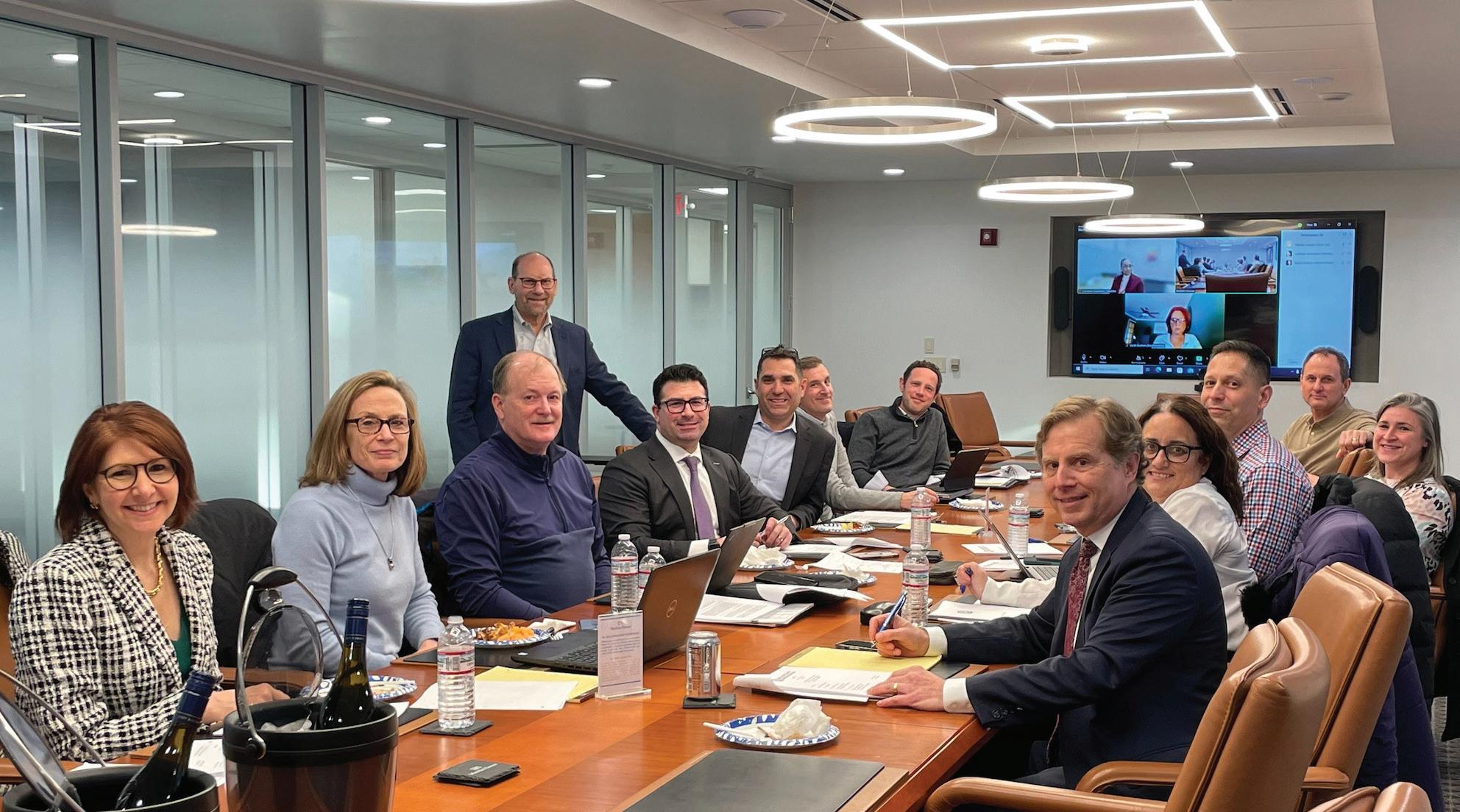
than yours if you have not spent that time. If a person in need is your equal, then they deserve your help.

The Oakland County Bar Foundation’s mission is to ensure access to justice and an understanding of the law in our community. It is dedicated to:
Improving and facilitating the administration of justice in Oakland County and throughout the state of Michigan;
Ensuring to the fullest extent possible that legal services are made available to all members of the public;
Promoting legal research and the study of law as well as the diffusion of legal knowledge;
Promoting the continuing legal education of lawyers and judges; and
Educating the public as to their legal rights and obligations, and fostering and maintaining the honor and integrity of the legal profession.
If you know an organization that could use assistance to pursue these goals within Oakland County, please refer them to ocba. org/ocbfgrants, where they can find information about applying for a grant from the foundation.
Because we learn. Many of the organizations the foundation supports address legal needs none of us face in our practices. For example, e Joseph Project provides legal support for survivors of sexual trafficking, some of whom are cruelly charged with crimes themselves. e Joseph Project assists the survivors in pursuing professional certifications, personal protection orders, crime victim compensation, driver’s license restorations, and many other needs. It is impossible to work with organizations like e Joseph Project or Lakeshore Legal Aid without gaining a greater appreciation for the nobility with which their clients face their obstacles and for the advantages we enjoy and sometimes take for granted. e foundation also supports efforts to educate Oakland County residents on their legal rights and obligations and about the legal system. Foundation grants to the Michigan Center for Civic Education make possible its mock trial program for high school students, and our support of the Oakland County Bar Association funds its Youth Law Conferences, Senior Law Days, Judicial Candidate Forums, and the Bench/Bar Conferences, at which lawyers and judges share perspectives and information.
Because it provides a social connection. e foundation’s donors, Fellows, and other supporters have a lot in common. We are judges, lawyers, or professionals who work with lawyers. We value the foundation’s work enough to donate our time or money to it. We have a stake in Oakland County and through the foundation seek to benefit it. So, it is not surprising we enjoy each other’s company. At functions like the Signature Event and the Fellows Reception, invariably happy occasions, we have a chance to socialize and form bonds within our community that extend beyond foundation activities. ese connections have been quite valuable throughout my career.
Because it is ful lling. e foundation’s work provides a multifaceted emotional boost. First, there is the sense of purpose and pride you gain from assisting our socially valuable grant recipients — valuable both for the individuals they serve and for the support networks they create. Corollary benefits include a sense of reward and happiness, a positive perspective, and the satisfaction of having paid it forward. ese perks are enhanced for those who take the time to interact directly with the grant recipients — some of whom invite us to their facilities to see firsthand the good work we sponsor.
Hopefully, some of this resonated with you. More information about the foundation is available on its website, ocba.org/ ocbf, including links on how you can help or become involved. For personal accounts of how important and rewarding it is to be involved with the foundation, the website includes contact information for the foundation’s officers and current and former trustees. Please reach out if you might like to offer your time or other resources.

Je rey G. Raphelson is the president of the Oakland County Bar Foundation and a member and general counsel of Bodman PLC. He focuses his practice on commercial litigation, particularly matters related to the automotive and banking industries, as well as general commercial cases involving contract, intellectual property, corporate governance and dissolution, and dealer and franchise termination disputes. He has served on numerous State Bar of Michigan committees and is a current board member and treasurer of the Historical Society for the U.S. District Court for the Eastern District of Michigan.
Adam Akeel
Vanessa Bailey
Uduak-Obong Bellomy
Ahmad Beydoun
Thomas J. Borkowski
Timothy Maxwell Carey
Erin R. Cobane
Kaitlyn Corr-Trogden
Daniel Crane
Arthur Dubei
Margaret E. Fitzgerald
Gracen Frazee
Amanda Gardner
Yevgeniya Gazman
Lauren Elizabeth Giese
Linda M. Goetz
Holly Gubachy
Adam Hamid
Tiffany J. Harvey
Lindsay Paige Hazen
Jasmyn Anise Hester
Ted William Hight
Sainath Rajan Iyer
Chris Jacobson
Rebecca Ann Jurva-Brinn
Dilan Joseph Kama
Kelsey Kanthack
Irina N. Kashcheyeva
Liza Kazimi
Michael Christopher Knoth
Abby Kushner
Magnolia Landman
Aleksandra Luca
Jack Kirkendall Mahon
Benton Christopher Martin
Kimberly McDade
Julia Siobhan Moran
Anthony J. Nardone
Kyra Marie Nielsen
Alaina Terese Norrito
Daniel S. Palmer
Debra N. Pospiech
James Roach
Miriam L. Rosen
Francesca Salamida
Vincent C. Sallan
Blake Matthew Schmidt
Aidan David Schurig
Philip R. Seaver
Michael Sekich
Allan John Sharp
Soosmita Sinha
Alanis Smith
Rita S. Soka
Stephanie Celina Squires
Claire Stancroff
Chanel Taylor
Pauline Bechara Tohme
Tina Toma
Jeremy Christopher Travis
Adam Wright
Madison Eve Wright
Marlene Zieah
The mission of the Oakland County Bar Association is to serve the professional needs of our members, enhance the justice system, and ensure the delivery of quality legal services to the public. We fulfill our mission through our 30 committees, regular networking events, and numerous educational programs for both OCBA members and the public. We work hand in hand with the OCBA volunteer board directors and members, and we partner closely with the courts.
Below are recent examples of the OCBA at work in service to the bar and to the community.
The Circuit Court Committee hosted a hybrid meeting the evening of January 14 with 15 members participating in person at the OCBA and 15 joining via Zoom. Judge Jeffery Matis was the speaker, and he discussed the upcoming new year, changes to the court rules, and new legislative bills. The event was not all business, as there was time to network and socialize among the court staff, judges, and attorneys who participated. This committee works with the Sixth Judicial Circuit Court and its judges to effect positive change in court business and procedures. The Circuit Court Committee is also responsible for the Virtual Discovery Mediator program on Wednesday mornings at the circuit court.
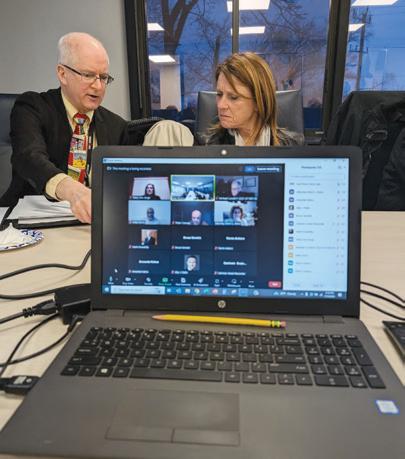


On the morning of January 28, the Real Estate Committee held a hybrid meeting with 13 members attending in person at the OCBA and two joining the meeting via Zoom. Before calling the meeting to order, in-person attendees enjoyed connecting with colleagues over morning refreshments. In addition to discussing plans for a joint seminar with the Debtor/Creditor Committee focusing on bankruptcy law and landlord/tenant law, the committee discussed several topics of interest to members.
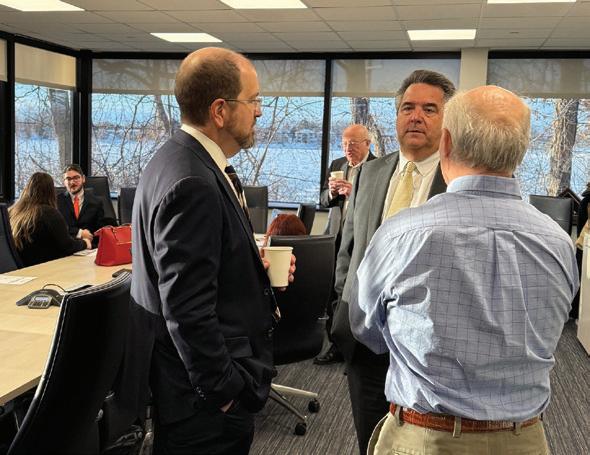


On January 15, nearly 50 OCBA members and guests “beat the winter blues” during an evening of valuable networking at Birmingham Pub. Members mingled and had fun while strengthening their professional relationships in a festive setting with delicious food and beverages.
On January 27, 130 distinguished Oakland County Bar Foundation Fellows were celebrated at the OCBF’s annual Fellows Reception at the Iroquois Club in Bloomfield Hills. The event honored individuals who actively support the OCBF’s charitable initiatives. This exclusive, invitation-only event was free for members of the OCBF Fellows Program.
Membership in the OCBF Fellows is a prestigious distinction, limited to less than 10% of the active members of the State Bar of Michigan who practice in Oakland County. To become a Fellow, one must be nominated by an existing Fellow. The program welcomes not only attorneys but also nonlawyers who demonstrate exceptional support for the legal community.



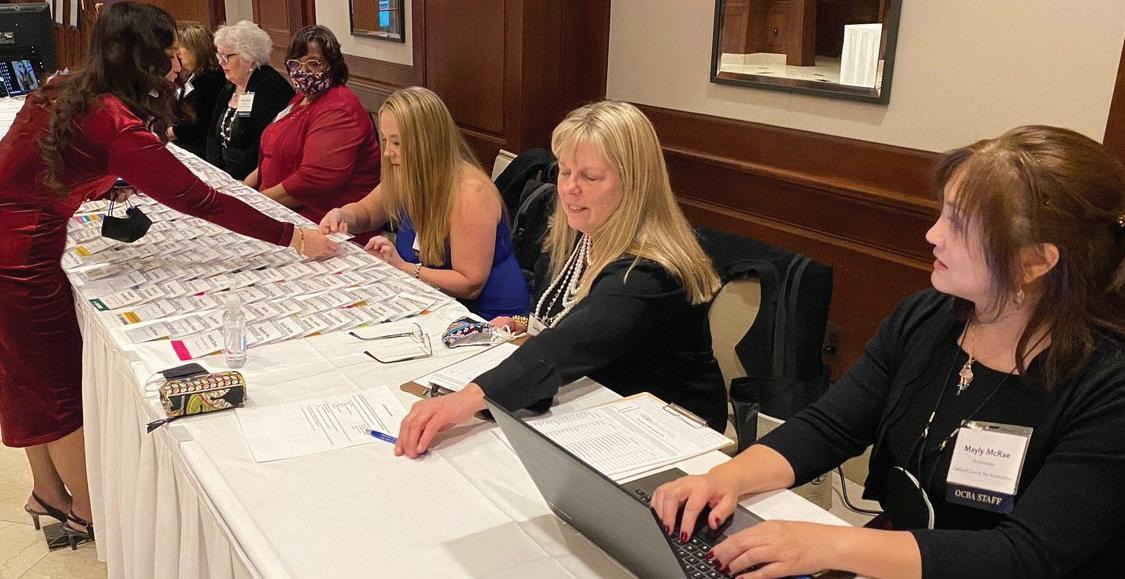
Executive Director
Jennifer Quick (jquick@ocba.org)
Deputy Director
Katie Tillinger (ktillinger@ocba.org)
Finance Director
Susan Maczko (smaczko@ocba.org)
Professional Development Director
Shanay Cuthrell (scuthrell@ocba.org)
Court Services Manager
Cristin Doble (cdoble@ocba.org)
Marketing Communications Specialist
MB Cairns (mcairns@ocba.org)
Bookkeeper
Mayly McRae (mmcrae@ocba.org)
Administrator – Court and Public Services
Janise Thies (jthies@ocba.org)
Administrator – Events and Member Services
Kari Ross (kross@ocba.org)
Administrator – LRS and Membership
Geni Fritch (gfritch@ocba.org)
Administrator – Laches and Foundation
Lori Dec (ldec@ocba.org)
Unless otherwise indicated, please call (248) 334-3400 for assistance.
Address Changes
Billing
Board of Directors
Case Evaluator Applications
Committees
District Court Case Evaluation
Event Photos
Finance
Inns of Court
Judicial Candidate Fora
Laches Magazine
Kari Ross
Mayly McRae
Jennifer Quick
Kari Ross
Katie Tillinger
Cristin Doble
MB Cairns
Susan Maczko
Shanay Cuthrell
Janise Thies
Jennifer Quick
Lawyer Referral Service – (248) 338-2100 Geni Fritch
Member Illness & Death Notification .........................Katie Tillinger
Membership ...............................................................Katie Tillinger
New Lawyer Admissions
News Releases
Oakland County Bar Foundation
OCBA Mediation Service
OCBA Policies
Pro Bono Mentor Match Program
Professional Development/CLE
Room Rental Reservations
Speakers Bureau
Volunteer Opportunities
Website
Katie Tillinger
MB Cairns
Katie Tillinger
Cristin Doble
Jennifer Quick
Janise Thies
Shanay Cuthrell
Kari Ross
Janise Thies
Janise Thies
Jennifer Quick
By Lisa R. Bremus
1. “Happily __ after”
5. Bar __
9. Time zone
12. Peak
13. The __ Ranger
14. Exclamation of surprise
15. __ __ recovery penalty for delinquent payroll taxes (2 wds.)
17. Comedian Lil __ Howery
18. Fairbanks of The Young and the Restless
19. Urge
21. Spangle
24. Matt of The Rainmaker
25. Factual
26. Western film
27. Affirmative answer
28. Actor __ Elise Goldsberry
30. Legal assoc.
33. Witherspoon of Legally Blonde
35. Beehive State
36. Range
37. Appraise
39. __ of the crime
40. French girlfriend
41. Paddle
42. Shareholders’ equity (2 wds.)
47. Web address (abbr.)
48. Vessels
49. Forearm bone
50. Star Wars character
51. Mireille of The Killing
52. Feel for
1. Dine
2. Not a DVR
3. Flightless bird
4. Save
5. Pixielike
6. Delete (2 wds.)
7. Jill Eikenberry in L.A. Law
8. Help resolve disputes
9. Field of law
10. Luster
11. To suspend the statute of limitations
16. Martial art: __ chi
20. French Mrs.
21. Pigpen
22. Poet’s “before”
23. When Form 941 payroll taxes must be filed
24. Actor Daniel __ Kim
26. __ Court of Justice
28. A __ officer collects back taxes
29. Compass point
31. __-relief sculpture
32. Delighted exclamations
34. Long period of time
35. Depletes (2 wds.)
36. Frighten
37. Stockpile
38. Sib
39. Bitter
40. Never: __ __ time (2 wds.)
43. Direction suffix
44. Peyton’s brother
45. Explosive
46. Speak
Answers can be found at ocba.org/laches
Sam Morgan & Greg Jones have a team of Employment Lawyers with decades of experience providing advice, counsel and representation to Employees and Employers in a wide variety of occupations, for:
• Wrongful discharge cases, including breach of employment contract, discrimination, harassment and retaliation
• Non-payment of compensation disputes, including commission, bonus and incentive compensation arrangements, and FLSA violations
• Enforcement of equity award agreements and minority shareholder rights
• Defending against mobility-killing non-compete and non-solicitation contracts
• Separation agreement reviews and severance negotiations
• Drafting employment contracts
• HR counseling, defending against government investigations






Our team includes Senior Associate, Barbara Urlaub*, and Of counsel attorneys, David Kotzian*, Donald Gasiorek*, Raymond Carey *, and Paul Hines *2024 Michigan Super Lawyers Honorees
Locations: Farmington Hills,


